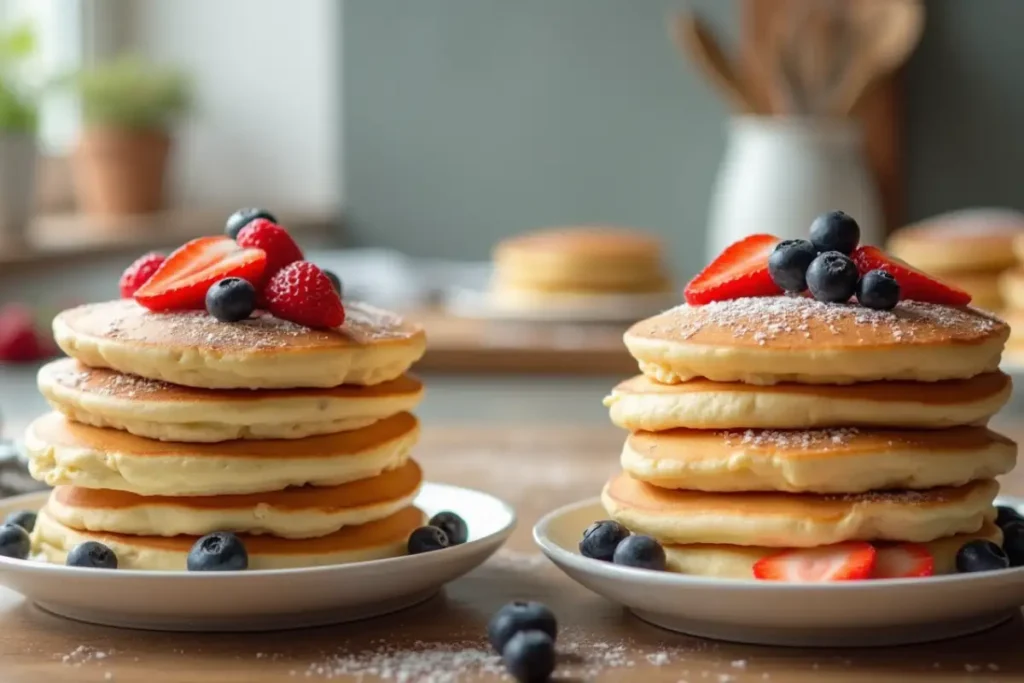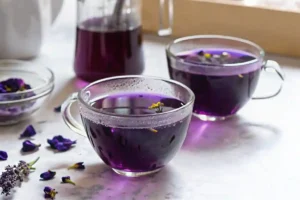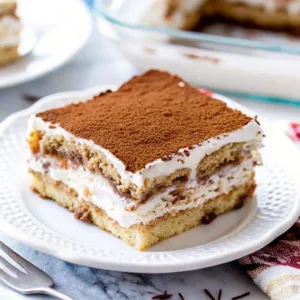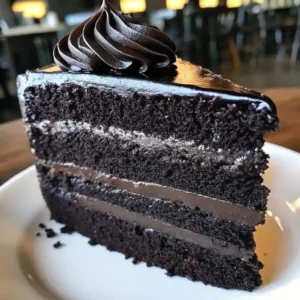What happens if I use milk instead of water in pancake mix? Pancakes are a popular breakfast food that can be customized to fit any preference. When served with fruit, syrup, or even whipped cream, pancakes have become a favorite for many. While making pancake batter, the recipe generally calls for water. However, many cooks wonder, what happens if I use milk instead of water in pancake mix? A simple change could make an enormous difference in the taste, texture, and nutritional value of the pancakes. In this post, we’ll explore the benefits of using milk instead of water in pancake mix, offering insights into how milk impacts the outcome and providing helpful suggestions for creating the perfect pancake mix.
Table Of Contents
Table of Contents
Why Choose Milk Over Water in Pancake Mix?
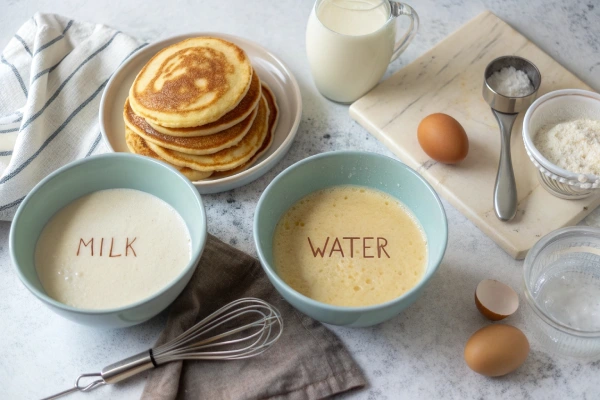
Both milk and water serve as liquids for activating the dry ingredients of pancake batter however, the choice of which liquid can affect the final result in a variety of ways. We will look at the main reasons to choose milk over water.
Flavor Improvement
One of the obvious advantages that milk can provide over water is the improvement in taste. The milk naturally contains sugars such as lactose that add some sweetness to pancakes. While water keeps the taste of the pancakes unaltered and nutty, milk provides a rich smooth, rich, and sweet taste that is more appealing to taste senses. This is particularly the case when it is paired with toppings such as fruit or syrup since the sweetness inherent in milk can enhance the overall flavor.
Improved Texture
Milk does not just enhance the taste, but it is also a key factor in enhancing how your pancakes look. Water can make the batter more thin and likely to become dense or flat when the cooking process. Milk however is rich in proteins and fats which help to create an easier and more creamy batter. This leads to fluffier and softer pancakes with a soft and airy feel. The fats in milk help make a moist crumb, making pancakes that are delicious and delicious.
Nutritional Boost
Another reason you should consider using milk in pancake batter is its nutritional value to breakfast. Although water is not calorie-laden and dairy products are low in calories, it provides many nutrients. They include:
- Calcium is Vital for healthy teeth and bones.
- Protein supports muscle repair and growth.
- Vitamins Vitamins A and D as well as B12, are plentiful in milk, resulting in greater immunity, and bone health in addition to energy production.
Making use of milk instead of water provides your pancakes with healthier and more nutritious flavor which makes them a healthier and healthy meal when served with healthy toppings such as yogurt or fresh fruit.
The Science Behind Milk in Pancake Mix
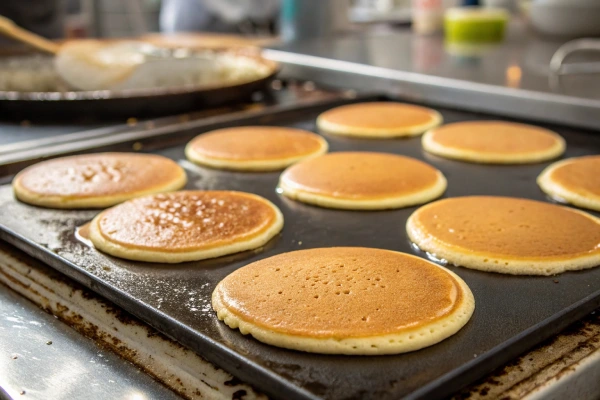
Milk Proteins and Gluten Interaction
Milk is full of proteins such as casein and whey, which interact with gluten in flour, when it is mixed into batter for pancakes. This mix helps to strengthen your pancake’s structure which is essential for it to have the right texture. Gluten helps to build structure, but milk’s proteins help soften it, resulting in an equilibrium between softness and toughness. It’s a soft pancake that won’t break or become too heavy.
The Maillard Reaction
It is known as the Maillard reaction and occurs as a chemical reaction that takes place when the food is heated causing browning and the creation of more complex tastes. When you add milk to this mix for pancakes, sugars (lactose) that are present in the milk can react with the amino acids contained in the flour. This process produces a deep golden-brown hue and a slight caramelization of taste that makes the pancakes visually appealing and adds taste.
Moisture Retention
Milk is a lot thicker than water and has fats that help keep the moistness of pancake batter. Pancakes made using water can dry out faster, but the milk’s fats aid in keeping the pancakes damp for longer. This retention of moisture is particularly useful if you are planning to make your pancakes ahead or store them in the freezer to use later.
How to Substitute Milk for Water in Pancake Mix
Substituting water with milk is an easy process however, it is important to adhere to some guidelines for the most effective outcomes. Let’s look at how to effectively substitute milk into a pancake mix.
Step-by-Step Guide
- Measure the milk The majority of pancake recipes that require water usually use between 1 and 1.5 cups of liquid per cup of dry mixture. If you are substituting milk, just replace the exact amount of water with milk. For instance, if the recipe specifies 1 cup water then you could substitute one cup of milk.
- Adjust to Thickness Sometimes, the addition of milk can cause a slightly thicker batter. If this occurs, you can add a little more milk to achieve that desired consistency.
- Mix gently Mix gently: Overmixing batter for pancakes can result in hard pancakes. It is important to mix the ingredients only until they’re combined. Lumps are fine so long as they’re not overly large.
Try different ways to make pancakes with pumpkin with pancake mix. For more tips on this topic, read pumpkin pancakes made with Pancake Mix: a Quick Autumn Breakfast Guide, in which we discuss ways to include seasonal tastes into your pancakes by making use of the mix.
Types of Milk to Use
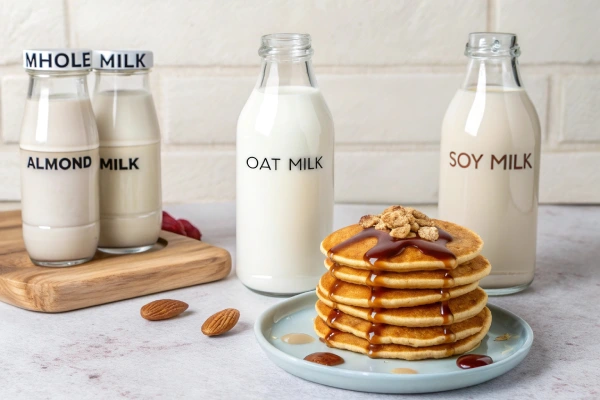
Different types of milk are not identical, and different types of milk can produce different outcomes. Here’s a list of the most typical milk types that you could make pancake batter with:
- Whole milk will be your most nutritious choice and can make the most fluffy, creamy pancakes. It has the most fat content, and this contributes to the taste and texture.
- Skim milk If you’re searching for a healthier alternative to fat skim milk is an excellent alternative. Although it doesn’t have as much creamy or flavor like whole milk does, it gives a satisfying result.
- Non-dairy Milk Almond milk, soy milk, oat milk, as well as coconut milk, are all excellent dairy-free alternatives. These milk alternatives behave similarly to dairy milk used in pancake mix, however,r certain varieties, such as coconut milk, may add a distinctive flavor to pancakes. If you want a mild taste almond or soymilk is a good choice.
Potential Drawbacks of Using Milk in Pancake Mix
Although milk can enhance your pancakes in a variety of ways, however, there are some possible drawbacks to be aware of.
Caloric Increase
Milk is a source of calories for your pancakes, particularly in the case of whole milk. If you’re trying to count calories or want a light breakfast, milk in place of water might not be a good choice for your diet objectives. You can reduce this by choosing lower-fat or non-dairy milk options.
Shorter Shelf Life
Pancake batter that is made from milk is more likely to spoil quickly than water-based batter. If you prepare an extra batch of batter to use later make sure you refrigerate the batter and take it out within a couple of days. To store it for a long time you might want to put the mixture in freezers because milk-based batters won’t last for as long as water-based ones.
FAQs: What Happens If I Use Milk Instead of Water in Pancake Mix?
Can I use milk instead of water in pancake mix?
Yes, you can substitute milk for water in the pancake mix. Milk adds richness, flavor, and a creamier texture to the batter, resulting in fluffier and more flavorful pancakes.
What effect does milk have on pancakes?
Milk enhances the taste and texture of pancakes, making them richer and more tender. It also adds protein and fat, which contribute to a golden-brown color and a slightly crisp exterior.
What will happen if I use milk instead of water in a cake mix?
Using milk in the cake mix creates a denser, moister, and richer cake. The added fat and protein in milk improve the cake’s texture and flavor, making it more indulgent.
Can you use milk instead of water in waffle mix?
Absolutely! Replacing water with milk in the waffle mix yields crispier, fluffier waffles with a richer flavor. Milk also helps achieve a golden-brown finish.
Conclusion
Making use of milk instead of water in your pancake mix can be a game changer in terms of improving the texture, flavor, and nutritional quality of your breakfast pancakes. The creaminess and richness that milk offers results in pancakes that taste better as well as more supple and visually attractive. In addition, milk provides the nutrients you need to make your breakfast more nutritious. If you’re using whole milk skim milk, or other non-dairy options The benefits of this easy substitute are evident. When you’re making pancakes, consider what happens when I make use of milk instead of water in my pancake mix? and see the wonderful impact it has!
Looking for more tasty recipes and cooking inspiration? Connect with us on Facebook at Dashtasty and become part of our foodie family.
